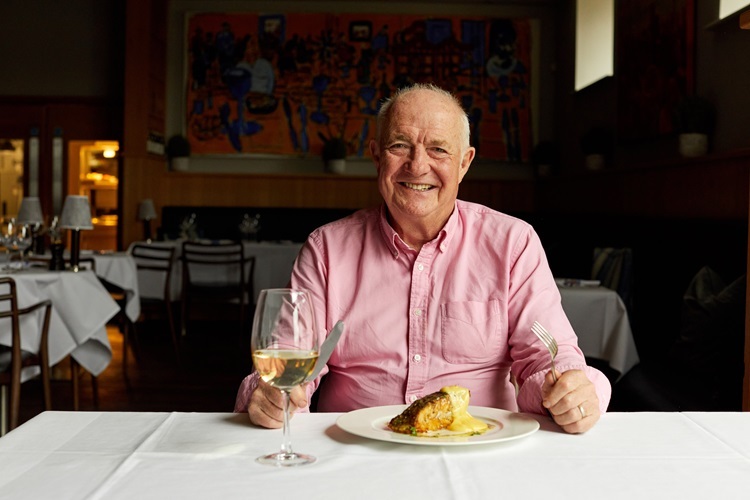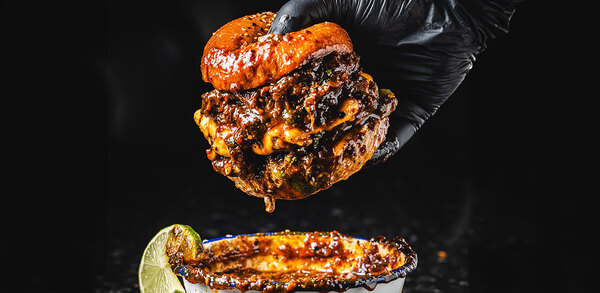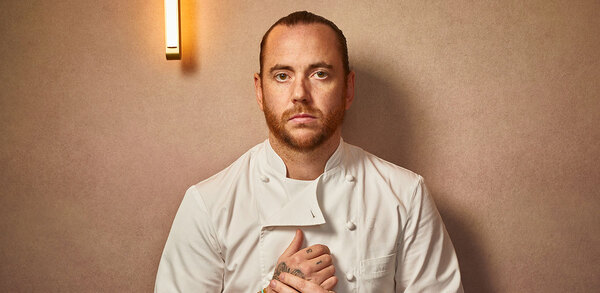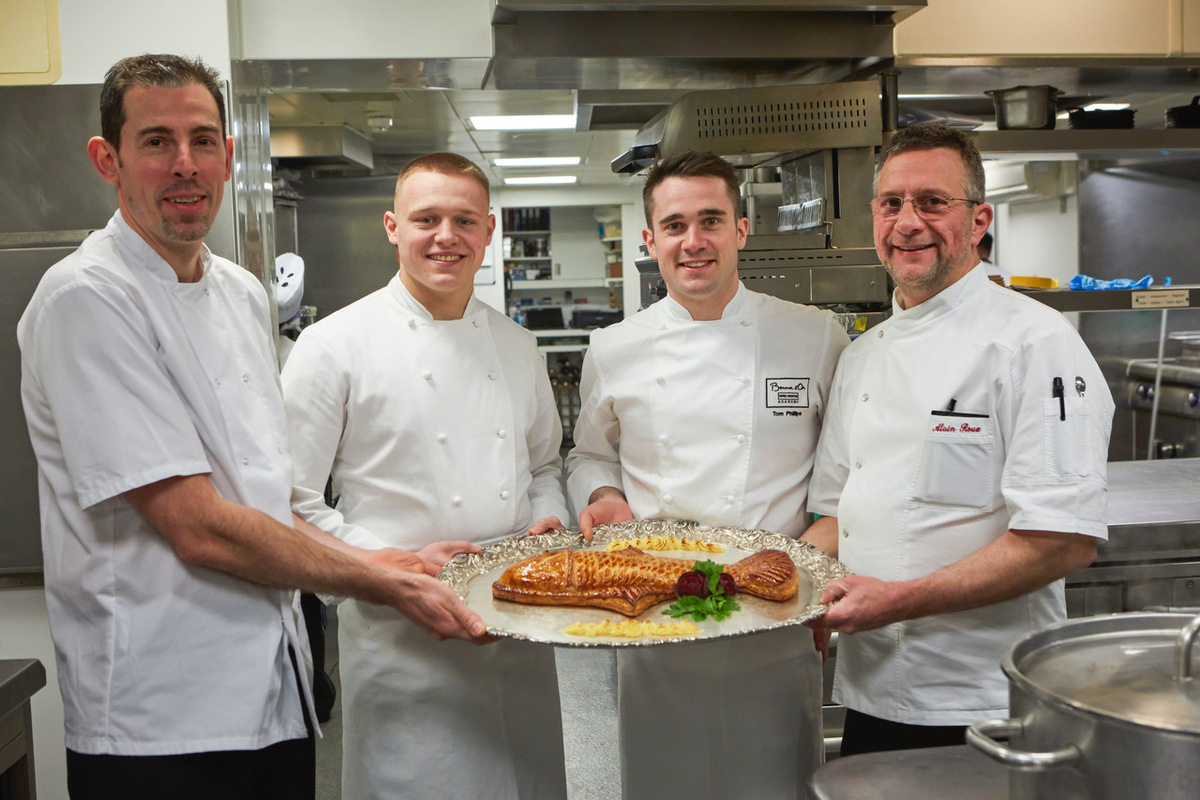Adam Smith named 2012 Roux Scholar
The 2012 Roux Scholarship final saw six chefs competing to produce turbotin jubilée in just two-and-a-half hours, with 24-year-old Ritz sous chef Adam Smith emerging triumphant. Kerstin Kühn reports
The Roux Scholarship is one of those competitions chefs enter over and over again, hoping for that ultimate success. Former scholars such as Simon Hulstone or Mark Birchall took four goes to win it, while others may enter numerous times and never even make it to the final.
But every now and then someone comes along and blows everyone out of the water. Like this year's winner, Adam Smith. Aged just 24, the premier sous chef at the Ritz London is not only one of the youngest ever scholars, he's also one of just a few in recent years to have won the competition at the first attempt.
A 2011 Acorn Award winner, Smith is already one of the UK's most experienced competition chefs, having won numerous accolades including a gold medal at the 2009 WorldSkills competition in Calgary. He assisted both former Roux Scholars André Garrett and Hulstone as commis chef at the 2007 and 2009 Bocuse d'Or respectively, and in 2010 he was selected to represent the English National Culinary Team at the Culinary World Cup in Luxembourg, winning a gold medal in the Restaurant of Nations. That same year, he also won the Craft Guild of Chefs' Young Chef of the Year award.
So how does the Roux Scholarship compare? "The best thing about the Roux Scholarship is the calibre of the judges - they are all at the top of their game and there is no other competition like it," Smith enthuses. "Being associated with the chefs who have won the Roux Scholarship in the past is amazing - it's such a prestigious group of chefs."
Smith's 2012 Roux Scholarship journey began when he submitted a paper entry recipe for spring chicken and veal heart sweetbreads for four people. His dish of roast spring chicken, glazed sweetbread, wild garlic and cauliflower impressed the judges enough to put him through to the regional finals, where he battled it out with 12 other hopefuls in the London heat (six chefs competed in Birmingham) and won himself a place in the final at Westminster Kingsway College.
Here the six finalists were asked to cook turbotin jubilée - whole braised turbot with lobster mousseline, scallops and caviar, garnished with artichoke bottoms and asparagus tips, served with a Champagne sauce. Inspired by Escoffier, it's a dish that involves a range of skills - from removing the bone of the fish without taking off the fillets, to making a mousse and Champagne sauce - so the chefs certainly had their work cut out for them.
Michel Roux explains: "It's a dish that requires good knowledge and dexterity of filleting fish but without really filleting it. Making a perfect lobster mousse also shows skill and the Champagne sauce must be light. It's not a dish for children and there's no time to play around."
Following 30 minutes of preparation, allowing the finalists to study the recipe, it became evident quite quickly that Smith knew exactly what he was doing. "I was quite happy with the recipe and I understood it right away," he says. "Making things like Champagne sauce and mousse is something I do at work almost every day so I felt quite relaxed and confident."
But it's also thanks to his mentor, Ritz executive chef John Williams, that he came out top. "Chef guessed it would be fish this year because it had been meat in the final for the past few years. We read through Escoffier and a lot of the dishes cross over and while I didn't practise this particular dish, I was familiar with the techniques."
plate up
However, what he wasn't familiar with was the kitchen equipment and when it was his turn to plate up, Smith realised with horror that his fish wasn't done. With three finalists in line to serve after him, the pressure to get his platter out was on and only added to by organisers rushing him to get a move on.
"The fish wasn't cooked and I made the decision that I would rather lose points by making the judges wait than send them fish that's undercooked," Smith explains. "In the end I was 10 minutes late and I thought I'd blown it."
But of course he hadn't blown it and his decision to keep the judges waiting paid off as judge and the 1999 Roux Scholar Sat Bains notes: "Adam made the call not to send the dish until it was ready, risking being disqualified, and that is what confident cooking is all about. It takes nerves of steel to do that under such intense pressure and shows real strength of character."
Fast forward to the prizegiving and Smith is completely incredulous at his success. When asked where he thought the award would take him he replies: "I have no idea, I'm just so surprised. I really thought I'd ruined my chances being late so I can't believe I won it."
A few days later and the award has settled in - a bit. He's given some thought to where he might spend his winning stage, citing "definitely France" and establishments including Yannick Alléno at Le Meurice, and Bernard Pacaud's L'Ambroisie in Paris, as well as Bras and Maison Pic.
But Smith is in no rush to change his career path. "I don't know where winning the Roux Scholarship will take me," he admits. "I'm very happy where I am at the Ritz and we are really trying to move forward. We're chasing accolades, chef [Williams] is giving me the opportunity to lead this and I'm really into that challenge. He has done great things for me and I'm not ready to go and do my own thing yet. Winning the Roux Scholarship will no doubt open doors for me but I will move on when it feels right."
The Finalists
Adam Smith, the Ritz, London(winner)
â- ****Edward Attwell, Loves restaurant, Birmingham
â- ****Quinton Bennett, the Arch, London
â- ****Arbinder Dugal, Le Pont De La Tour, London
â- ****Pramod Ghadge, Catlin Underwriting Agencies operated by Harbour & Jones, London
â- ****Robert Hutchins, Rudding Park hotel, Harrogate
Â
the judges
â- ****Michel Roux, owner, the Waterside Inn, Bray, Berkshire
â- Alain Roux, chef-patron, the Waterside Inn, Bray, Berkshire
â- Michel Roux Jnr, chef-patron, Le Gavroche, London
â- ****Andrew Fairlie, chef-patron, Restaurant Andrew Fairlie, Auchterarder
â- ****Sat Bains, chef-proprietor, Restaurant Sat Bains with Rooms, Nottingham
â- ****James Martin, restaurateur and TV presenter
â- ****David Nicholls, director of food and beverage, Mandarin Oriental Hotel Group
â- ****Brian Turner, president, Academy of Culinary Arts
â- ****Gary Rhodes, chef-restaurateur
Â
Comments from the judges
SAT BAINS, ROUX SCHOLAR 1999
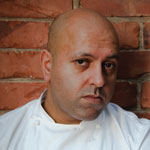
It's a massive honour for me to come on board as a judge. When I won the scholarship in 1999 it presented a lifeline for me. I was about to be made redundant and I don't think I would have had the successes that I have had without the Roux Scholarship. I feel privileged to be able to give something back to the competition now, inspire these young guys and give them hope that they can do it too. Winning the Roux Scholarship doesn't guarantee success. It puts you on the radar and you have to capitalise on what that offers you. The Roux Scholarship is a family and that's what I want the scholars to see.
ON THE FINAL
It brings back a lot of memories, walking into the kitchens and seeing the faces of the chefs. I only remember about 10 minutes of my final, the rest of it is a complete blur. The finalists would have felt a lot of emotions, it's a massive rollercoaster. What tends to happen is that you look over your shoulder to see what the other chefs are doing. It's a bit unfortunate really because if you see someone doing things differently to what you're doing you immediately question yourself. The trick is to have a clear idea in your head of what you want to do. But the pressure the competitors are under is immense - with all the judges walking around, constantly looking over their shoulders, tasting everything, it's hugely intimidating. But it's also the pressure of what winning the Roux Scholarship means. Some of these chefs might be looking for that next step in their careers and to use this as a stepping stone.
ON TURBOTIN JUBILee
It was a very difficult dish that required lots of different skills and we could see that many of the guys just weren't experienced enough in them. It's so important that these skills continue to be celebrated, we don't want these young chefs to lose them. The dish has to be presented beautifully - the whole point of these showpiece dishes is that they are aesthetically beautiful.
You need to think outside the box but that comes with experience. The best way to cook the turbot is to sous-vide it as this will guarantee it cooks at an even temperature. At the end only 10% is judged on the method of cooking, 70% is down to presentation and flavour (20% on health and safety and following the recipe). So it's worth taking the risk in the kitchen and sacrificing those marks if you know the end result will be perfect.
ON ADAM SMITH
We could see very early on that Adam is a very good technician and very disciplined. His dish was far superior and it was the one I liked the most. It was beautifully presented, the flavours were great, the mousse was lovely and overall it tasted fantastic and I kept going back for more.
Â
ANDREW FAIRLIE, ROUX SCHOLAR 1984
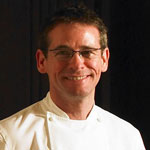
We had a record number of entries this year but one of the biggest problems was that there seemed to be a lack of mentoring. You could see that recipes hadn't been checked and that the chefs didn't have the support of their head chefs. With Adam you could tell that John Williams had really taken an interest in the competition and helped him prepare for it. Ultimately, that's what won him the title.
ON TURBOTIN JUBILeE
The recipe involved some quite basic techniques such as making a mousse, but some of the finalists didn't know how to do it. Instead of putting it over ice when adding the cream they put it in at kitchen temperature which means it split. Some of them went wrong with their interpretation of the recipe and removed the black skin of the turbot before cooking the fish, which ruined the presentation and also meant that the skin wasn't there to keep the fish moist during the cooking process. It's so important to use the 30 minutes at the beginning to draw up a plan of how you are going to work and stick to that but so many of them didn't do that. Those who did were very organised. Four of the finalists made fundamental mistakes, which immediately put them out of the running.
ON ADAM SMITH
Right from the start we could see that Adam knew exactly what he was doing. He was very well organised, clean and methodological, he managed his commis well and his work ethic reflected that he has been very well schooled. He performed under pressure and took his time despite people rushing him to get his dish out. His dish was by far the cleanest. From the presentation to the seasoning, the consistency of the fish and the flavour of his sauce, it was brilliant. If it wasn't a perfect 10 it was 9.5.
Â
ROUX SCHOLARSHIP PRIZES
As the 29th Roux Scholarship winner, Smith receives £5,000 and an invitation to cook and train under the supervision of a leading chef at a prestigious three-Michelin-starred restaurant anywhere in the world for up to three months, courtesy of the Savoy Educational Trust.
Additional prizes include:
â- An invitation for two to enjoy a tasting menu with complimentary wines at Roux at Parliament Square, courtesy of Restaurant Associates.
â- An all-expenses-paid trip for two to visit the wine cellars of Gosset at Epernay, including a guided tour of the production process and a tasting of the Gosset range. Travel by Eurostar and overnight accommodation with bed and breakfast, courtesy of Champagne Gosset.
â- An overnight stay at Gidleigh Park for two people for two nights in a master room including dinner, wine and travel plus an opportunity to meet Michael Caines, thanks to Bridor.
â- A trip for two to visit the Caffé Musetti roasting factory with flights, transfers and a night's accommodation in Milan, courtesy of L'Unico.
â- A subscription to Caterer and Hotelkeeper for one year.
â- One year's complimentary membership of the Institute of Hospitality.
â- An exclusive Jeroboam of Gosset Grande Réserve NV, signed by all the judges.
â- A Global Knives 10-piece stainless-steel Michel Roux Jnr knife block set, silver anniversary knife and Global whetstone holder and whetstone.
â- Registration on the Best Practice Forum's "Professional Hospitality Management Development Programme" in conjunction with University of West London. This includes a Management Study Unit of Smith's choice , courtesy of Hospitality and Leisure Management.
â- A one-year subscription to Chef Magazine (six issues) and a selection of sought-after cookbooks.
â- Two personalised Roux Scholarship chef's jackets, courtesy of Bragard.
â- A De Buyer Mandoline Ultra.
Â
Recipe: Turbotin Jubilee
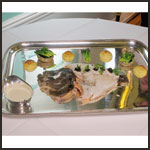
Â
Â
Â
Â
Â
Ingredients
(List for preparing and cooking your dish in 21/2 hours to serve four)
For the turbot
1 turbot of 1.5kg
4 large scallops
3kg white fish bones
100g unsalted butter
4 leeks
3 "Spanish" onions
2 celery sticks
375ml dry white wine
50g King's oscietra "Royal Belgian caviar"
1 lemon
Thyme/bay leaves
For the lobster mousse
1 x 500g Canadian lobster
700ml double cream
2 eggs
Salt
Cayenne pepper
For the artichoke bottoms and asparagus tips
(Prepare the artichoke bottoms in the usual manner and cook them in a "blanc". Fill them with asparagus tips.)
2 medium globe artichokes
32 small green asparagus
50g plain flour
100ml olive oil
1 lemon
1 bunch of flat leaf parsley
300g spinach leaves
For the Champagne sauce
100g unsalted butter
4 "normal" shallots
375ml Champagne Gosset
500ml double cream
For the potato duchesse, for the presentation tray (optional):
3 large Desiree potatoes
Rock salt
4 eggs
1 bunch chervil
Method
Prepare the fish as to be stuffed. Cut down the centre of the turbot from the beginning of the head to the tail on the black skinned side; detach both fillets from the bones almost to the beginning of the fins; cut carefully through the spine at both ends then separate and remove the bones from the underlying flesh.
Season the inside of the fish; stuff it with sufficient lobster mousse to give it a rounded appearance. Lay the fish in a well-buttered deep dish of a suitable size; add a little fish stock and cover it with a lid and shallow poach (braise) gently in the oven.
When the fish is almost cooked, lay a line of sliced scallops overlapping along the centre of the fish from head to tail.
When cooked, drain the turbot well, place it on a suitable dish and dot the scallops with caviar. Arrange the artichoke bottoms around the fish with the asparagus and serve accompanied with Champagne sauce.




